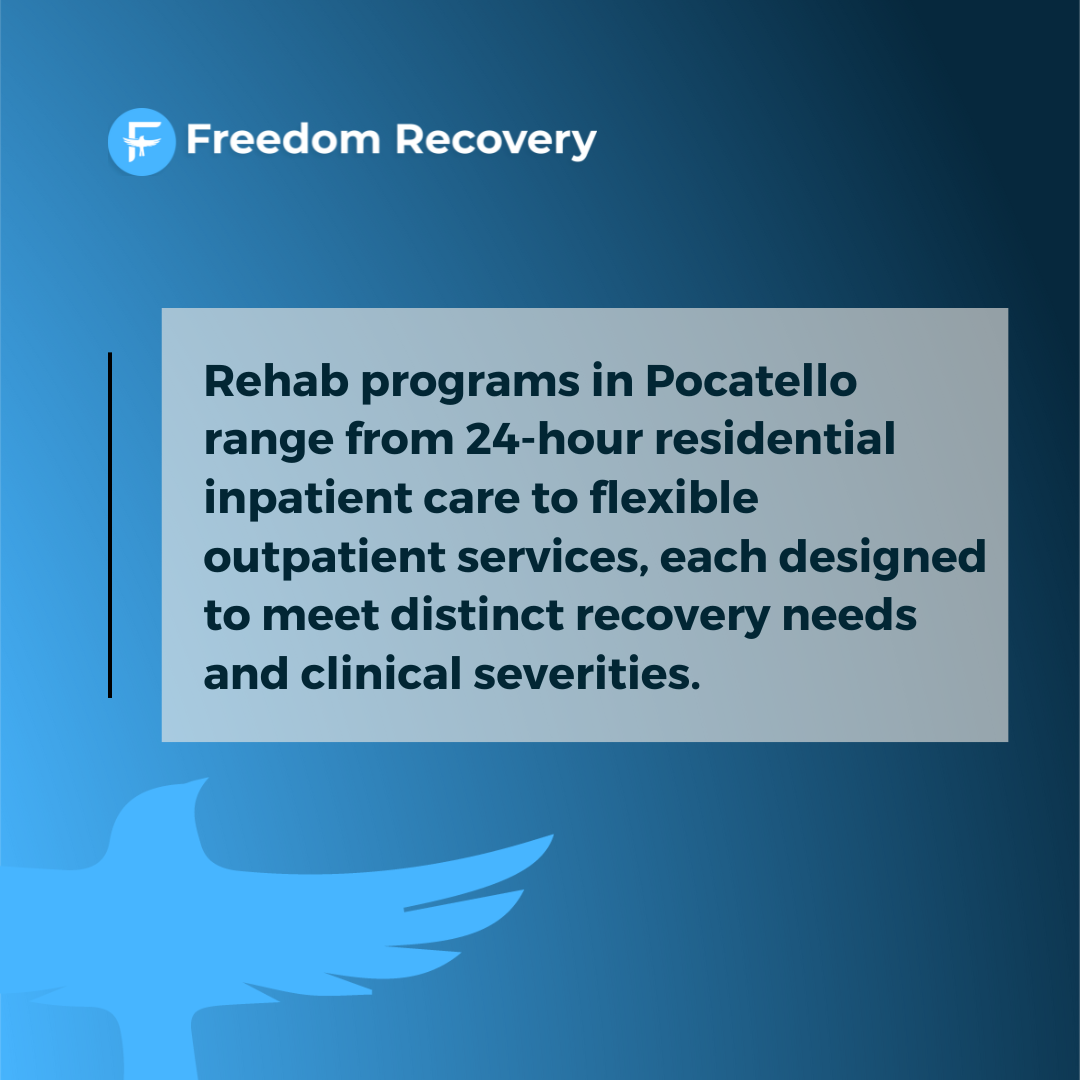

Rehabilitation offers life-changing recovery paths for people who battle substance abuse and co-occurring mental health disorders. In Pocatello, Idaho, these facilities are at the forefront of curbing the city’s — and the wider Bannock County’s — addiction issue.
With local overdose fatalities exceeding 20 annually in the county and fewer than one in ten people receiving treatment, finding the right rehab center is essential for safety, support, and lasting wellness.
This guide delivers in-depth coverage of program types, conditions treated, therapeutic modalities, selection criteria, and community resources. All these are designed to help you make informed, confident choices about rehab Pocatello.

Rehab programs in Pocatello range from 24-hour residential inpatient care to flexible outpatient services, each designed to meet distinct recovery needs and clinical severities. Understanding these levels of care ensures you select the right intensity and support for detoxification, therapy, and long-term relapse prevention.
Inpatient rehab provides round-the-clock medical supervision and structured therapy in a residential setting. Here, you live onsite, engaging in individual and group counseling, evidence-based therapies, and medical detox when needed.
As with other cities, Pocatello rehab centers with this service offers an immersive approach. The goal is to stabilize severe withdrawal symptoms and lay a foundation for sustained recovery.
Outpatient rehab in Pocatello delivers similar evidence-based therapies on a part-time schedule, allowing you to maintain home, work, or school commitments.
In this setting, you attend scheduled counseling, medical appointments, and peer support groups while living independently. This flexibility is particularly helpful if you have mild to moderate substance use disorders.
What Are Detox Centers and Their Role in Pocatello Rehab?
Detox centers specialize in medically supervised withdrawal management, stabilizing clients through medication-assisted protocols and symptom control. This first step addresses acute physiological dependence before therapy begins.
Typically, Pocatello detox programs integrate nursing care, psychiatric evaluation, and referral to residential or outpatient treatment to ensure continuity of care.
Intensive Outpatient Programs (IOP) and Partial Hospitalization Programs (PHP) bridge the gap between inpatient and standard outpatient care by offering day-treatment schedules.
PHP participants attend clinical services five days per week for six to eight hours, while IOP typically meets three to five evenings per week. Both formats emphasize group therapy, individual counseling, medication management, and family education without requiring overnight stays.
Sober living homes provide peer-supported, substance-free housing with curfews, chores, and accountability structures that reinforce early sobriety. Aftercare planning includes ongoing outpatient counseling, alumni groups, and community recovery meetings to prevent relapse. These transitional environments help sustain therapeutic gains and guide individuals back into full community integration.
Before exploring specific conditions treated in Pocatello, it helps to compare how these program types align on setting, duration, and level of supervision.

Rehab Pocatello facilities treat a wide range of substance use disorders and psychiatric conditions, often integrating dual-diagnosis care to address co-occurring mental health issues.
Alcohol addiction treatment combines medical detox, cognitive-behavioral therapy, 12-step facilitation, and motivational interviewing to reduce relapse risk. Clinics monitor liver function, offer nutritional counseling, and provide group support, while certified counselors guide clients through coping skills development and long-term sobriety planning.
Opioid use disorder in Pocatello is treated using MAT medications such as buprenorphine, methadone, and naltrexone alongside behavioral therapies. MAT stabilizes cravings and withdrawal, allowing clients to engage fully in counseling and relapse-prevention strategies. Licensed practitioners tailor dosing and psychosocial support to individual needs.
Treating methamphetamine addiction focuses on intensive behavioral therapies, including cognitive-behavioral therapy (CBT) and contingency management, to reshape thought patterns and reinforce abstinence. While no FDA-approved pharmacotherapies exist, peer support groups and psychiatric care for co-morbid depression and anxiety are integral to recovery.
Dual diagnosis treatment integrates simultaneous care for substance use disorders and mental illnesses, such as bipolar disorder, PTSD, or personality disorders, within a unified treatment plan. Coordinated psychiatric evaluation, medication management, and trauma-informed therapy reduce relapse by addressing underlying psychological triggers and stabilizing mental health.
Rehab centers offer specialized modalities: trauma-informed care, EMDR (Eye Movement Desensitization and Reprocessing), DBT, and mindfulness-based stress reduction. The goal is to alleviate anxiety, depression, and PTSD symptoms. Psychiatrists prescribe antidepressants or anxiolytics as needed, and therapists provide coping strategies that strengthen resilience during and after addiction treatment.
Rehab Pocatello employs a blend of talk therapies, medical interventions, and experiential methods to deliver holistic, personalized care.
Cognitive Behavioral Therapy identifies and restructures negative thought patterns that drive substance use. By challenging distorted beliefs and teaching coping skills, CBT reduces cravings, prevents relapse, and improves emotional regulation.
DBT combines cognitive-behavioral techniques with mindfulness to target emotion dysregulation and self-destructive behaviors. In rehab settings, DBT equips you with distress-tolerance skills, interpersonal effectiveness strategies, and mindfulness practices that enhance stability, self-esteem, and relapse prevention.
MAT in Pocatello integrates FDA-approved medications (e.g., buprenorphine and naltrexone) with counseling and group support. Physicians conduct thorough assessments, initiate medication regimens, and adjust dosing over time. This combined approach addresses neurochemical imbalances while clients engage in behavioral therapies.
Individual therapy provides one-on-one counseling tailored to personal history and goals. Meanwhile, group therapy fosters peer support and shared accountability. On the other hand, family therapy involves loved ones in education, communication skill-building, and boundary-setting.
Trauma-informed care recognizes the impact of adverse experiences on substance use and integrates safety, trust, and empowerment principles throughout treatment. Adventure therapy uses outdoor activities (e.g., hiking, ropes courses, and team challenges) to build confidence, problem-solving skills, and group cohesion.
Understanding coverage options and verification processes for rehab Pocatello ensures you access the right care without financial surprises. Pocatello centers generally accept public and private plans, self-pay, and sliding-scale fees.
Yes, Idaho Medicaid covers medically necessary substance use disorder treatment, including inpatient, outpatient, and MAT services at certified facilities. Coverage varies by plan tier, so verifying specific benefits is essential before enrollment.
Most local providers accept Blue Cross Blue Shield, Aetna, UnitedHealthcare, Cigna, and Humana. Plans typically cover detox, inpatient stays, individual therapy, and partial hospitalization, subject to deductible and co-insurance requirements.
Medicare Part A and B cover inpatient psychiatric care, partial hospitalization programs, and outpatient mental health services. Medicare Part D may cover MAT medications like Suboxone.
Several clinics offer sliding-scale fees based on income, and community health centers provide grant-funded or county-subsidized treatment. Veterans may access VA-funded programs, while court-mandated clients can qualify for state-supported funding.

Selecting a rehab center involves evaluating accreditation, specialized programs, patient outcomes, environment, and personalized fit.
Look for Joint Commission or CARF accreditation, Idaho Department of Health licensure, and SAMHSA-certified programs. Accreditation ensures adherence to evidence-based standards, staff qualifications, safety protocols, and continuous quality improvement.
Specialized tracks address unique cultural, developmental, and trauma-related needs. Veteran-focused programs integrate PTSD care and VA benefits coordination, adolescent programs prioritize family involvement and schooling continuity, and LGBTQ+-affirming services foster inclusive environments for identity-related support.
When assessing a rehab center, consider asking these questions:
Proximity to family networks and home responsibilities can support outpatient transitions, while serene, distraction-free settings enhance residential rehab focus. Campus amenities like private rooms, recreational areas, and communal spaces all contribute to comfort and peer bonding.
Pocatello hosts a mix of specialized residential, outpatient, and hospital-based treatment providers with diverse offerings.
Freedom Recovery specializes in integrative outpatient and residential care with evidence-based therapies, gender-specific groups, and intensive family programming. Its licensed counselors and medical team provide MAT, CBT, and relapse-prevention coaching.
Additional providers include Moonlight Mountain Recovery, Portneuf Medical Center, Raise the Bottom Training & Counseling Services, Gateway Counseling, High Country Behavioral Health, Ideal Option MAT clinics, and Health West City Center Clinic.
Most facilities offer integrated psychiatric assessment, licensed clinical social worker support, group-based trauma therapy, and personalized care plans. As stated, specialized tracks for veterans, adolescents, and LGBTQ+ clients ensure cultural competence and clinical efficacy.

Apart from rehab Pocatello Idaho facilities, various community resources extend treatment support through peer networks, sober housing, and more.
Alcoholics Anonymous and Narcotics Anonymous convene multiple times weekly at community centers, churches, and recovery drop-in centers. Meeting schedules and locations are updated monthly by local intergroup councils.
Sober living homes provide structured, substance-free environments with peer accountability, chore requirements, and transitional coaching for six- to twelve-month stays.
Peer support specialists with lived experience facilitate recovery coaching, sponsor matching, and group facilitation. Meanwhile, community programs like recovery fairs, sober social events, and volunteer opportunities strengthen belonging and prevent isolation.
Early intervention services include family education seminars, school-based prevention programs, and screening for at-risk youth. These initiatives promote recognition of substance use signs, improve communication skills, and encourage timely treatment referrals.
If you’re looking for rehab Pocatello options, Freedom Recovery offers programs that work with your schedule and goals so treatment feels possible, not overwhelming. Reach out today!

Explore inpatient rehab Idaho and understand the challenges that come with it. Learn strategies to navigate therapy, structure, and emotional hurdles.

Know what Wernicke-Korsakoff or wet brain syndrome is. Learn why alcohol misuse can lead to this neurological condition and how you can prevent it.

Prepare for a safe and effective detox with guidance from addiction treatment Idaho programs. Learn how to get ready physically, mentally, and emotionally.